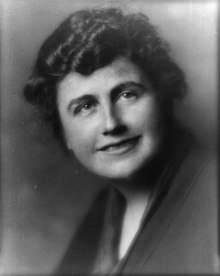 Edith Bolling Galt aka Edith Wilson was the second wife of the 28th president of the United States, Woodrow Wilson. She served as first lady from 1915-192. According to the article from whitehouse.gov, "After the President suffered a severe stroke, she pre-screened all matters of state, functionally running the Executive branch of government for the remainder of Wilson's second term." After this, she was also known as the secret president.
Edith Bolling Galt aka Edith Wilson was the second wife of the 28th president of the United States, Woodrow Wilson. She served as first lady from 1915-192. According to the article from whitehouse.gov, "After the President suffered a severe stroke, she pre-screened all matters of state, functionally running the Executive branch of government for the remainder of Wilson's second term." After this, she was also known as the secret president.
Edith was born in Wytheville in 1872 to Sallie White and Judge William Holcombe Bolling. She was the seventh child of her parents out of her eleven siblings. At the age of 15, she went to Martha Washington College to study music. According to the Article from whitehouse.gov, "Visiting a married sister in Washington, pretty young Edith met a businessman named Norman Galt; in 1896 they were married. For 12 years she lived as a contented (though childless) young matron in the capital, with vacations abroad." In 1908 her husband died unexpectedly. It is also said that Edith met President Wilson through her chains of her friendships. President Wilson fell in love with Edith Galt and proposed to her and said "in this place time is not measured by weeks, or months, or years, but by deep human experiences...", pbs.org. Their marriage was not much of a big celebration as they married secretly on December 18, 1915 at Edith's residence. During WWI, Edith accompanied President Wilson to Europe when the allies conferred on terms of peace. After the War, when Wilson's health failed Mrs. Wilson took over many routine duties and details of government. But she did not initiate programs or make major decisions, and she did not try to control the executive branch. She selected matters for her husband's attention and let everything else go to the heads of departments or remain in abeyance. Her "stewardship," she called this. And in My Memoir, published in 1939, she stated emphatically that her husband's doctors had urged this course upon her.In 1921, the Wilsons retired to a comfortable home in Washington, where he died three years later. A highly respected figure in the society of the capital, Mrs. Wilson lived on to ride in President Kennedy's inaugural parade. She died later in 1961: on December 28, her husband's birthday.
Sources:
https://www.whitehouse.gov/1600/first-ladies/edithwilson
http://www.firstladies.org/biographies/firstladies.aspx?biography=29
http://www.pbs.org/wgbh/amex/wilson/portrait/wp_edith.html
http://www.history.com/topics/first-ladies/edith-wilson
One of the things that I really liked about this article is how you mentioned that Edith temporarily stepped in for Wilson while his health was failing then latter on in the article you brought that point back up but went into more depth as to exactly how she handled the situation. Do think if Edith was a man in the same position as she was, he would have attempted to take more power into his hands?
ReplyDeleteHow do you think Edith's management of Wilson's duties affected the situation at the time, particularly the league of nations? You mentioned that she did not make any major decisions, but I wonder if the absence of his decisions and input noticeably shaped the government's course of action. Certainly, his inability to continue his tour of the country promoting the league of nations played a role in it not being ratified.
ReplyDeletemore about how much influence Edith had:
http://michiganradio.org/post/edith-wilson-first-lady-and-acting-president#stream/0
As Emily mentioned you stated that she did not try to make any major decisions for her husband, but you also state that she selected which matters to bring to her husband's attention. And this would seem to me like the perfect time to indirectly take control of the presidency, even if it is indeed not for noticeably large things, it still gives her a reasonably large amount of control. What makes you say that she did not try to take control of the executive branch, even if it was just a little?
ReplyDeleteThis was really interesting and well- written. Do you think Edith's indirect ruling over the executive was constitutional/ effective? I would argue that after Wilson's tour, the inability to generate greater support from Americans was largely due to Edith's jurisdiction in the White House.
ReplyDeletehttp://www.history.com/this-day-in-history/wilson-embarks-on-tour-to-promote-league-of-nations